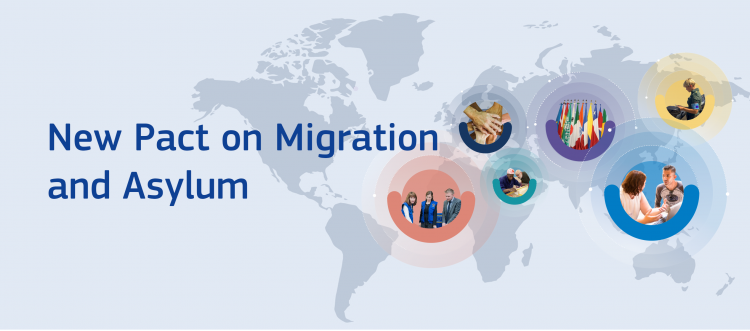In February, the ICMPD and the Directorate-General Migration and Home Affairs (DG HOME) co-hosted the workshop “From Pilot Projects to Talent Partnerships – Exploring the future of legal migration to the European Union (EU)” bringing together EU actors, member state and partner country representatives, and labour mobility project practitioners. The workshop was organised to share and reflect on stakeholders’ hands-on experience of implementing pilot projects on labour migration as the EU is gearing up to launch a new policy framework for cooperation on legal migration.
The high number of participants showed the event’s timeliness as well as a high level of interest on the topic: more than 200 participants joined throughout the workshop - among them representatives of 16 EU member states and over 70 individuals working for non-state actors.
What was discussed?
Three main themes emerged from the daylong event: first, the continuous need for labour market research. It is crucial to jointly identify possible skills gaps in the labour markets, as well as skill mismatches with partners throughout the project. This keeps them agile to labour market developments and allows to react to unexpected events while reflecting mutual interests. The need for research, time, and flexibility against shifting priorities was highlighted along with the importance of systematisation of skill matching and recognition. The project PALIM (Pilot Project Addressing Labour shortages through Innovative labour migration Models) that sought to provide training and work experience to young Moroccan graduates in the Belgian ICT sector, for example, integrated an action-research component in their activities which allowed to take corrective measures as the project unfolded. The European Training Foundation (ETF) stressed the essential and continuous need for data and research on educational quality. The International Organisation for Migration (IOM) explained that thorough research keeps projects responsive to changing circumstances, as in the case of MATCH, which has implemented a hybrid mobility scheme during COVID-19 to allow for remote working before physical mobility can take place.
A second focus area emerged around challenges of coordination and matching of expectations among multiple stakeholders with diverging interests in labour migration initiatives. Being transparent about all policy goals and taking time for continuous dialogue about respective needs and possible alignment strategies can help initiatives address these struggles. This was stressed throughout the workshop multiple times, in light of the sensitivity of work in the area of labour migration with its high bureaucratic complexity and practical challenges when engaging with public, private and social partners. Regarding the matching of expectations, the European Commission’s Directorate-General Neighbourhood and Enlargement Negotiations (DG NEAR) highlighted the need to avoid brain drain in partner countries by balancing interests and training talents for the local labour market. The MENTOR project provided a working example of multi-stakeholder coordination spanning across all governance levels. The project implemented a city-to-city cooperation model, where cities successfully took the lead in coordination with public and private institutions, development cooperation agencies, and International Organisations in the region. In the YGCA (Young Generation as Change Agents) project, Spanish and Moroccan Ministries supported the recognition of Moroccan graduates’ skills and previous degrees for their post-graduate studies and skill advancement in Spain.
Third, opportunities and challenges of scaling up for sustainability were discussed. Speakers highlighted the importance of institutionalising existing schemes and including formal skills recognition mechanisms and tangible indicators to define success. Several speakers stressed the need for a dedicated monitoring and evaluation system in order to uncover the added value of ongoing and completed labour mobility initiatives. Private sector engagement was acknowledged as a crucial factor to consider for the financial sustainability of Talent Partnerships. Telesoftas, a private company, explained that their experience with the Digital Explorers project added value by allowing access to an international talent pool and improving English communication in the company. In addition, multiple project representatives voiced that a holistic approach to build an enabling environment will allow for sustainable structures in Talent Partnerships.
Implications for Talent Partnerships
First, skills matching and labour market research should continue but also expand and diversify to include soft skills and address potential for low- and middle-skill pathways, as projects have mostly responded for the need for highly skilled profiles. ETF shared a good practice of an initiative in Georgia where skill and job matching for both middle and low skilled workers took place and created sustainable cooperation structures.
Second, allowing for time and flexibility is key to ensuring successful multi-stakeholder coordination. The Spanish Secretary of State for Migration explained that Talent Partnerships “will be a multi-stakeholder, multi-country, multi-tier, multi-interest instrument. So it must be multi-flexible and accommodating to its complexity”, succinctly summarising the critical need for flexible stakeholder coordination, which was also echoed by DG HOME saying “flexibility will be the key word.”
Third, pilot projects’ scale-up can be beneficial at multiple levels for multiple parties. Improving coordination capacity in the country of origin and destination, diagnosing structural problems that lead to skill gaps, as well as diversifying and expanding business were highlighted as benefits by the Center for Global Development highlighted. GIZ (German Development Cooperation Agency) also stressed that partnerships help make the most out of individual actors’ competencies and enable efficiency gains.
Conclusion
The workshop provided an important occasion for policy makers, project practitioners and other actors to take stock of their experience and envision together what Talent Partnerships could look like. Despite the complexities, it will not be impossible to seek deeper impact together in the scale-up to Talent Partnerships. Acknowledging a clear EU added-value as well, DG HOME confirmed the EU’s continued commitment to build upon important structures already developed and add value to existing cooperation frameworks between member states and third countries.

